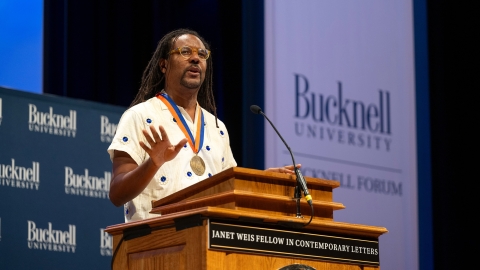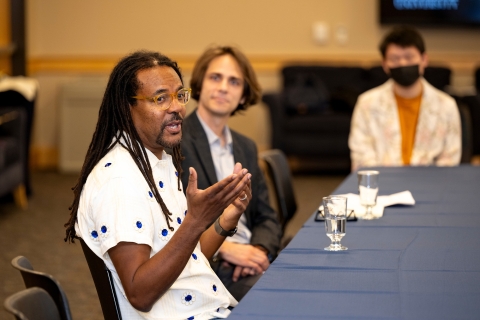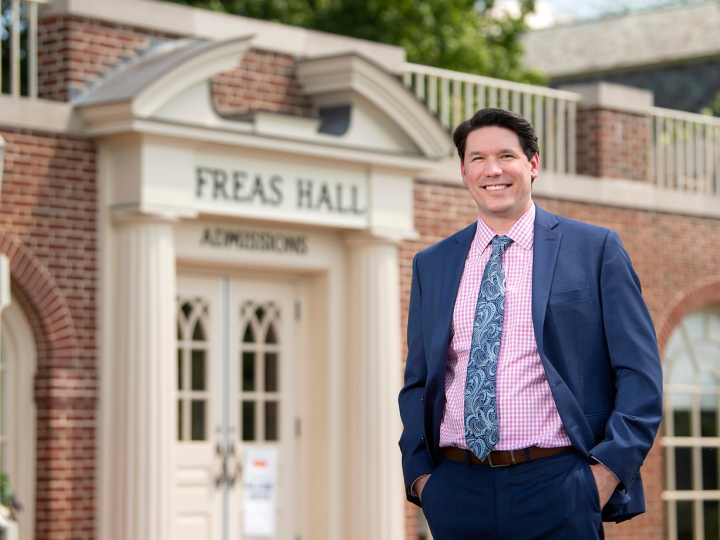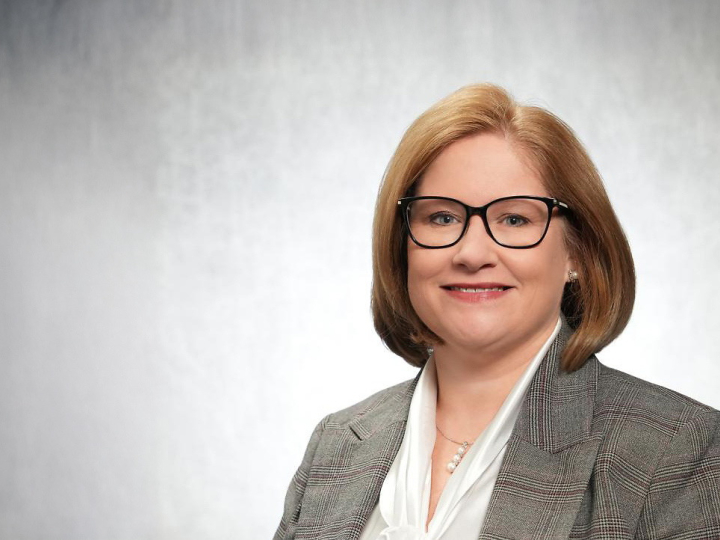
Colson Whitehead Accepts Weis Fellow Prize
September 10, 2024
Colson Whitehead, the 14th Janet Weis Fellow in Contemporary Letters, delivered public remarks on the evening of Sept. 9 in the Weis Center for Performing Arts. Photo by Emily Paine, Marketing & Communications
The journey of an illustrious writing career begins with a single rejection. Or, in the case of some of the country’s most critically acclaimed authors, a steady trickle of rejections that inspire periods of self-doubt that eventually, with the appropriate amount of grit, luck and television, give way to an idea that becomes a story. "I wanted to be a writer from an early age, but I really became a writer once my first book didn't sell," said Colson Whitehead, the 14th Janet Weis Fellow in Contemporary Letters at Bucknell University, a biennial award which honors and recognizes individuals who represent the highest level of achievement in the craft of writing within the realms of fiction, non-fiction or biography.
During a day that included a pre-talk student session moderated by Joe Scapellato, English, and which culminated in a public speech on the evening of Sept. 9 in the Weis Center for Performing Arts, the two-time Pulitzer Prize-winner shared the humble origins of his own writing journey with the characteristic wit, humor and discursive insight that define his published works.

Colson Whitehead attended a pre-talk student session moderated by Joe Scapellato, English. Photo by Emily Paine, Marketing & Communications
The author of 11 books of fiction and nonfiction, including Sag Harbor, the First-year Common Reading for the Class of 2028, Whitehead is also the recipient of the Carnegie Medal for Fiction, a MacArthur Fellowship, a Guggenheim Fellowship, a Whiting Writers Award, the Dos Passos Prize and a fellowship at the Cullman Center for Scholars and Writers. However, long before he was named "America’s Storyteller" by Time magazine, he was just a kid in New York who loved Stephen King, comic books and the magical realism of Gabrielle Garcia Marquez. It was this combination of eclectic tastes that formed the foundation of a career marked not by an allegiance to a particular genre, but to the art — or rather, the work — of storytelling.
After the rejection of his first fiction manuscript, which centered on the misadventures of a Gary Coleman-like figure, Whitehead had a kind of epiphany, he told the audience. "I realized there's nothing else that made me humble like being a writer, so I just got myself up off the floor and started doing it," he said. "No one else is going to write the book I wanted to write. I had to keep going because I believed in the work, and I believe I became a better writer."
For Whitehead, believing in the work is not just about a dedication to the act of writing, but also a willingness to take inspiration from wherever it comes. "One question I get a lot is, where do you get your ideas?" said Whitehead, who explained that television and movies were a reliable source of ideas, including for his first novel, The Intuitionist, which came from watching a Dateline NBC segment on the hidden dangers of escalators. His zombie apocalypse novel, Zone One, was born from a dream. "It’s not often you get a book from a dream," he said. "I was a bit lucky."
In between the work of inspiration and writing also lies the challenge of knowing when it’s the right time to pursue a particular story. For instance, Whitehead first had the idea for the novel The Underground Railroad in the year 2000. "I thought it was such a good idea and I knew that I would screw it up if I did it back then," he said. "I didn’t think I was wise enough or mature enough to write about slavery. I didn't think it was a good enough writer to pull it off structurally, so I put it in a drawer."
Every couple of years, Whitehead revisited and discussed the idea with friends and colleagues to see if he was ready. After The Underground Railroad was published in 2016, Whitehead became the sixth-ever writer to receive a National Book Award and a Pulitzer Prize for the same book. "Even after eight books, I had to be reminded that the book that scares you — the book you don’t think you can do — is the one you should be working on."
Whitehead closed out his speech by sharing that he is now working on a crime trilogy set in Harlem. It’s a new genre for him, though the inspiration behind it comes from the familiar territory of renting and watching movies, kicking around a few ideas and believing in the work that has led him to where he is today.
Upcoming speakers for the 2024-2025 Bucknell Forum include NBC News Washington correspondent Yamiche Alcindor; comedian, TV host and producer W. Kamau Bell; pioneering actor and activist George Takei; and a fourth speaker to be announced at a later date.

